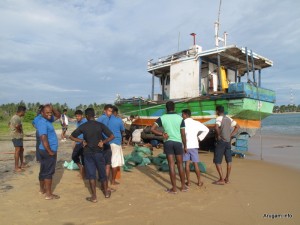SRI LANKA: Fighting over fish
Order ethionamide tb
COLOMBO, 16 October 2009 (IRIN) – The seas off Batticaloa in the country’s former war-torn east are home to one of the most fertile spawning grounds off Sri Lanka, and fishermen rarely had to travel far for a good catch.
But of late, traditional fishermen who use boats powered by outboard motors or canoes to fish have complained of meagre harvests.
“I went out on five consecutive days, and only yesterday did I return with some fish, but only 6kg,” said Tamil Chelvam, who operates a boat from Tirivendu beach, just south of Batticaloa.
Locals blame a recent influx of large fishing trawlers into their waters for their dwindling catches. Before the encroachment, a good catch would earn fishermen up to US$174, and a normal catch, about $85.
But now, after paying helpers and offsetting other expenses, including fuel, the small catches do not leave them with much, they say.
“They have big boats, big nets and they stay out at sea for days,” S. Paskaran, who has been a fisherman for more than two decades, told IRIN. “The problem for us is that they catch in shallow waters and deep sea, but we can only go a certain distance.”
Post-war opportunities
Sri Lanka’s eastern waters were not exploited until 2008, despite being rich fishing grounds.
The country’s bloody civil war was based on demands by the separatist Liberation Tigers of Tamil Eelam (LTTE) for an independent state in the north and east. During the war, the LTTE established its base in the northeast, making the waters off that part of the island out of bounds.
The 26-year conflict ended in May 2009, when government forces defeated the LTTE. However, the rebels were forced out of the east much earlier, in mid-2007, and the waters gradually opened for fishing.
Larger boats have been arriving in increasing numbers since the end of the war, say locals.
The boats come from major southern fishing ports, including Negombo, and also from Kalmunai, an important fishing hub about 40 km south of Batticaloa.
Development boon
With Sri Lanka’s economy expected to grow by as much as 6 percent next year, officials say they hope to see more development in Batticaloa, and Valaichchenai, a fisheries harbour about 30km north of the town.
“More development like ice factories and harbour facilities means larger boats will come in as time goes on,” Domingo George, the assistant district director for fishing for the Batticaloa District, told IRIN.
The Fisheries Department issues permits to boats from outside Batticaloa and George said there were 27 such boats operating out of Valaichchenai.
Most now in operation off the harbour were about 9.75m long, George said, adding that larger boats were a boost to the local economy, which had been sapped by years of conflict.
“When the development of the harbour is complete, we will see boats as large as 45ft [13.7m] coming in,” he said.
He said larger boats had been barred from shallow water fishing, but most of them employed people from the local community as deck hands and for other work.
Monitoring trawlers
The chief minister of the country’s Eastern Province, Sivanesathurai Chanthrakanthan, said there had been no public complaints so far of over-fishing by multi-day trawlers.
But the problem has the potential to affect hundreds of traditional fishermen living along the coast, and Chanthrakanthan said the government would keep an eye on the situation.
“So far we have not heard any complaints like that. It may be an isolated case or a trend that people have just begun to notice,” he told IRIN. “If it turns out to be a persistent issue, we will have to look into it.”
While boats outside the region cannot operate without proper authorization, fishermen said there had been reports of large trawlers staying out at sea for months in the area off Batticaloa.
They said government intervention would be needed to safeguard their incomes, as they lacked the finances to acquire newer boats or equipment.
“If we continue to get small hauls like this, we will ask for restrictions on outside fishing,” Paskaran said. “We thought the end of the war would be good for us, but we never anticipated this.”
contributor/ey/mw
[END]

 Arugam Forum
Arugam Forum Arugam Photo Galleries on Picasa
Arugam Photo Galleries on Picasa Old Website
Old Website Press Coverage
Press Coverage Surf Forecast for Arugam Bay
Surf Forecast for Arugam Bay
0 Responses to “Fishing Trawlers at Arugam Bay & North”